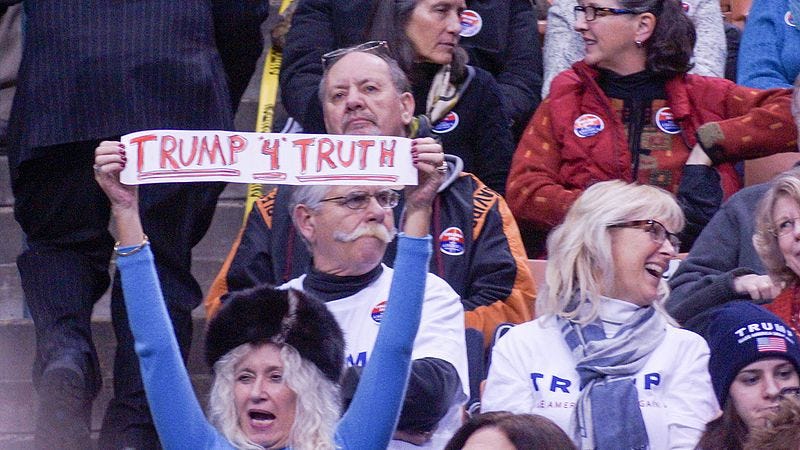Trump and Truth
Are people always either telling the truth or lying?
If you have a knee-jerk and absolute reaction to anything about Trump, in either direction - i.e., if you are convinced that he is the epitome of evil who could never have done anything good, or if you a certain that he is a hero who does no wrong - this post is not for you and I’d like you not to read it, and certainly not to comment on it.
The topic of Trump and truth brings up heated emotions. For his supporters, Trump is the ultimate truth-teller. Obama was incapable of saying the words “Islamic terrorism”; Trump gained tremendous popularity for speaking blunt truths that were politically incorrect. On the other hand, for his opponents, Trump is the ultimate liar - the Washington Post lists over thirty thousand false or misleading claims, and that’s just during his presidency.
Back when I was having arguments with people about the scientific merits of evolution, I gradually came to a realization that such arguments were a bad idea. Beyond the general impossibility of changing people’s minds in an argument, there was another problem. The whole idea that we were having a “scientific argument” was a farce. Science is about weighing up evidence from the physical world. But for my opponents, the only thing that mattered was their theological conviction that it was heresy. While they may have pretended to be interested in discussing the scientific arguments for or against, this was actually not at all relevant to them - and obviously their “conclusions” about the scientific evidence were predetermined.
I was reminded of this when reading about the case against Trump for falsely claiming that the election was stolen and that he had the right to reject the results (and successfully convincing tens of millions of Americans into believing this, thereby causing enormous damage to the fundamental legitimacy and authority of the system of US government). Apparently, Trump’s defense is going to revolve around the claim that he really sincerely believed these things, based on the information and legal advice that he received, and that its his lawyers and advisors who should get the blame. The prosecution, on the other hand, is going to argue that he knew it was false.
It seems to me that there is a third possibility. While most people sometimes tell the truth and sometimes lie (i.e. say things that they know to be false), Trump does not have a binary pattern. Rather, his whole grasp of the concept of “truth” is completely different from that of normal people.
A while ago, there was a fascinating and revealing interview with Tony Schwartz, Trump’s ghostwriter for The Art of the Deal. Schwartz was stunned when Trump later claimed that he himself had written the book - and appeared to be actually convinced that this was true! Schwartz spent eighteen months in close contact with Trump when he wrote the book, and says, “More than anyone else I have ever met, Trump has the ability to convince himself that whatever he is saying at any given moment is true, or sort of true, or at least ought to be true.”
This is exactly what happened with the election. Trump is incapable of ever conceding that he failed at something. Even before the election took place, Trump made it absolutely clear that the only possible outcome was that he would win, and that any other alleged outcome would be a fraud. It’s not that after the election, he examined the evidence and concluded that the election was stolen - he made it clear beforehand that no other reality is conceivable.
There is another illustration of his strange relationship with the concept of truth. While Trump was president, there were many occasions on which he made statements which sounded shocking, and he or his team later claimed that he was only joking or that he was being sarcastic. Yet most of these were cases where it certainly seemed that he was being serious - in some cases, he insisted on it at the time! But I’m personally not convinced that he actually knows (or cares) what the difference is.
I wonder if perhaps many of his devotees have adopted this approach. Do they really, truly believe that there was a massive conspiracy involving Trump’s own appointees to falsify the election results? (Wouldn’t this mean that he was very, very bad at appointing people to run things?) Or is it more that they are so opposed to the Democrats and so badly want Trump to be President instead of Biden, that the facts about the election are not actually significant?
Trump once famously declared that he could shoot someone dead in the street and not lose voters. I saw one interview with a Trump devotee - a calm, soft-spoken person - who was refreshingly honest. The interviewer asked him whether he would retract his support if Trump were to publicly murder an innocent person. The man thought for a moment and admitted that he wouldn’t. The interviewer asked him why. The man answered, “Because I like him.” I think that’s an extraordinary admission. This man might not involve morality in his voting decisions, but I appreciate his honesty!
(I’m not interested in responses to this post along the lines of, “But Trump had great policies! But he moved the embassy! But Biden is bad for Israel and bad for America!” Those topics are not the subject of this post. Please just deal with the point being discussed.)




Updated (in 2016) version of an old joke: George Washington could never tell a lie. Richard Nixon could never tell the truth. Donald Trump could never tell the difference.
What is the point of this post ?